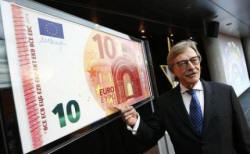|
 ECB's
Mersch: next meeting could yield combination of
policies, implementation may vary ECB's
Mersch: next meeting could yield combination of
policies, implementation may vary
 Send a link to a friend
Send a link to a friend
[May 28, 2014]
By Stanley White
TOKYO (Reuters) - A
European Central Bank meeting next week could yield a
combination of policies to tackle low inflation and low
credit growth, but the timing of the implementation
could vary, ECB Executive Board member Yves Mersch said
on Wednesday.
|
|
 When asked about the chance of a cut in the ECB's three main
interest rates, Mersch said he assumes the differential between the
rates, which is called the corridor, will be maintained because
narrowing the corridor could harm interbank markets. When asked about the chance of a cut in the ECB's three main
interest rates, Mersch said he assumes the differential between the
rates, which is called the corridor, will be maintained because
narrowing the corridor could harm interbank markets.
Mersch also said that he did not see deflation on the horizon for
the euro-zone but the central bank was preparing for this
contingency just in case.
Other ECB officials have made similar reassurances on deflation, but
there are worries that downward pressure on prices has become
entrenched after the financial turmoil and spiralling jobless rates
caused by Europe's debt crisis.
"Expectations have been raised because we have made it public that
we are comfortable acting with both conventional and unconventional
measures," Mersch told reporters on the sidelines of a conference at
the Bank of Japan.
"What we've been doing is broadening our tool box and we will
present some of these findings to the Governing Council."

ECB President Mario Draghi said after the ECB's May meeting that the
Governing Council was "comfortable with acting next time" - its June
5 policy meeting - but wanted to see updated economic projections
from the bank's staff first. He said he expected inflation, now
running at 0.7 percent, to slowly return to the ECB's target of just
under 2 percent.
Reuters reported earlier this month that the ECB is preparing a
package of policy options for its June meeting, which includes cuts
in the deposit rate, the main refinancing rate and the marginal
lending rate.
The main refinancing rate is currently 0.25 percent and the marginal
lending rate, or emergency borrowing rate, is 0.75 percent.
The deposit rate currently stands at zero, so taking it into
negative territory would mean charging banks for parking their money
at the ECB overnight.
[to top of second column] |

ECB officials have said that a negative deposit rate is an option,
and Mersch's comments suggest that if the ECB takes this route, it
will cut all three rates by the same margin to maintain the corridor
and avoid damaging money markets.
Other tools on the shelf include an injection of cheap long-term
funds with pricing linked to an increase in net lending and
preparing targeted measures aimed at boosting lending to smaller
firms.
The ECB is crafting policy options to prevent volatility in the
short-term money market from harming longer-term funding and ensure
proper functioning of the credit channel in the euro-zone, Mersch
said.
The euro exchange rate is playing a more important role for prices
as inflation is very low, but the ECB is not targeting the exchange
rate to boost competitiveness, Mersch said.
(Editing by Kim Coghill)
[© 2014 Thomson Reuters. All rights
reserved.] Copyright 2014 Reuters. All rights reserved. This material may not be published,
broadcast, rewritten or redistributed.
 |